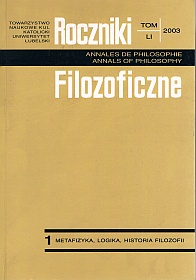O cenności racjonalności w wierze religijnej
Abstrakt
The issue of rationality of religious beliefs belongs to the main problems of 20th century philosophy of religion. When posing this problem the term `rationality' is often used in a way that is not precise, and sometimes it seems to be ambiguous. In order to avoid this error I define rationality of acceptance regulatively as a property consisting in being in accordance with defined epistemic rules of the ethics of beliefs. The main rule that is taken into consideration here is the following requirement: `Each theorem p accepted by person S should be justifiable by her in a degree proportional to the degree of assertion with which he accepts p'. Acceptances having the property of so defined rationality belong to a broader class of reasonable acts, where rationality is understood as a property consisting in being a reliable use of human cognitive abilities. I claim that although the religious faith of a `common' Christian is not rational in this sense, as mysteries of faith are not justifiable by natural reason, it has a reasonable character and is precious from the epistemic point of view. I defend the proposition that the fact of not being rational in this particular sense does not involve irrationality that consists in breaking the rule that orders a change in the way of accepting a certain theorem p so as to adjust the degree of assertion to the justification one has, the borderline case being one of rejecting the theorem for which one does not have any epistemically valid justification. The proposition that one of these rules is obligatory for the believer with respect to his acceptance of the propositions of faith cannot be justified without stating that Christianity is false. This latter proposition cannot be proved philosophically.
Bibliografia
Alston W. P. (1988), The Deontological Conception of Epistemic Justification, „Philosophical Perspectives”, 2, s.257-299.
Anscombe G. E. M. (1979), What Is It to Believe Someone?, w: Rationality and Religious Belief, red. C. J. F. Delaney, Notre Dame–London: University of Notre Dame Press, s. 141-151.
BonJour L. (1996), Plantinga on Knowledge and Proper Function, w: Warrant in Contemporary Epistemology, red. J. L. Kvanvig, Lanham: Rowman & Littlefield Publishers, Inc., s. 47-71.
Chisholm R. (1983), The Foundations of Knowing, Minneapolis: University of Minnesota Press.
Feldmann R. (2000), The Ethics of Belief, „Philosophy and Phenomenological Belief”, 60, no. 3, s. 667-695.
Forrest P. (1997), The Epistemology of Religion, w: The Stanford Encyclopedia of Philosophy (Fall 1997 Edition), red. Edward N. Zalta,URL=http://www. illc.uva.nl/ŹSEOP/ARCHIVES/FALL1997/ENTRIES/religion-epistemology/index. html.
Galewicz W. (1998), O możliwości etycznej definicji uzasadnienia, w: tenże, Studia z etyki przekonań, Kraków, s.139-148.
Herbut J. (1997), Racja, w: Leksykon filozofii klasycznej, red. J.Herbut, Lublin: Towarzystwo Naukowe KUL, s. 457- 458.
Hudson D. W. (1975), Wittgenstein and Religious Belief, London–Basingstoke: Macmillan Press.
Kenny A. (1983), Faith and Reason, New York: Columbia University Press.
Kleszcz R. (1998), O racjonalności. Studium epistemologiczno-metodologiczne, Łódź: Wydawnictwo Uniwersytetu Łódzkiego.
Mackie J. (1997), Cud teizmu. Argumenty za istnieniem Boga i przeciw istnieniu Boga, Warszawa: PWN.
Pepliński M. (1999), Przyjaźń rozumu i wiary, czyli jak zjednoczyć filozofię z wiarą tak, aby uszanować godność obydwu, w: Polska filozofia wobec encykliki Fides et ratio, red. M. Grabowski, Toruń, s. 235-246.
Pepliński M. (2000), Trzy koncepcje racjonalności przekonania o istnieniu Boga. Analiza argumentacji Alvina Plantingi, „Kwartalnik Filozoficzny”, 28, nr1, s. 25-50.
Plantinga A. (1983), Reason and Belief in God, w: Faith and Rationality. Reason and Belief in God, red. A. Plantinga, N. Wolterstorff, Notre Dame: University of Notre Dame Press, s. 16-93.
Plantinga A. (1988), Chisholmian Internalism, w: Philosophical Analysis. ADefence by Example, red. D. F. Austin, Dordrecht–Boston–London: Kluwer Academic Publishers, s. 127-151.
Plantinga A. (2000), Warranted Christian Belief, New York–Oxford: Oxford University Press.
Rowe W. (1975), The Cosmological Argument, Princeton: Princeton University Press.
Stępień A. B. (1999), Wartości poznawcze w ujęciu współczesnej filozofii tomistycznej, w: tenże, Studia i szkice filozoficzne, t.I, Lublin: RW KUL, s. 197-237.
Zagzebski L. (1996), Virtues of the Mind, Cambridge: Cambridge University Press.
Copyright (c) 2003 Roczniki Filozoficzne

Utwór dostępny jest na licencji Creative Commons Uznanie autorstwa – Użycie niekomercyjne – Bez utworów zależnych 4.0 Międzynarodowe.





